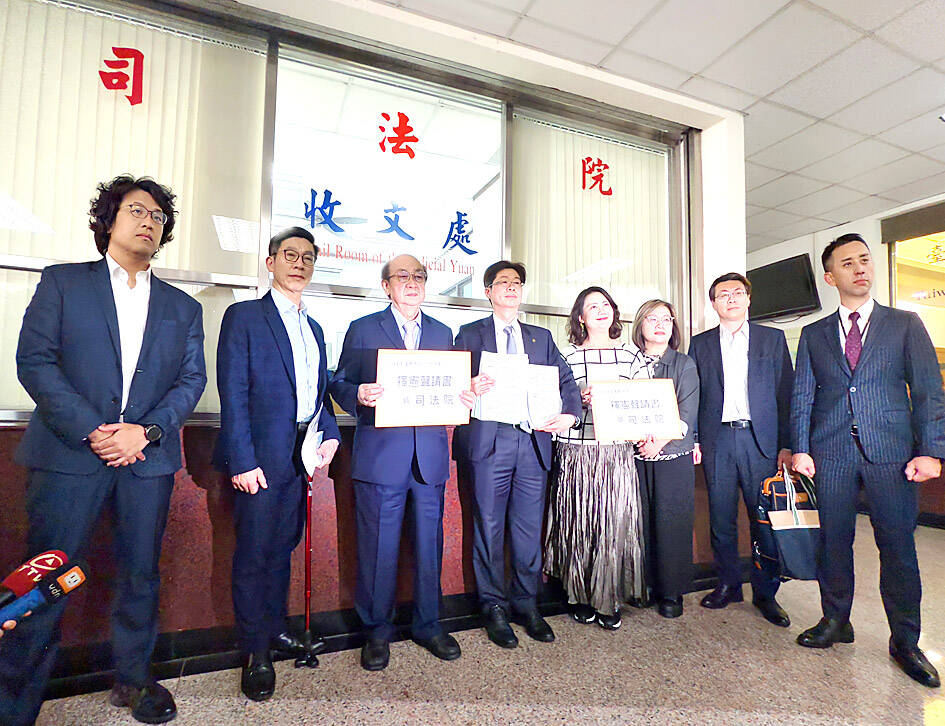Democratic Progressive Party (DPP) legislators yesterday requested a constitutional judgement of this year’s central government budget and amendments to the Act Governing the Allocation of Government Revenues and Expenditures (財政收支劃分法).
The Legislative Yuan passed the third reading of the budget allocation amendments, which were proposed by the Chinese Nationalist Party (KMT), on Dec. 20 last year, and the annual budget on Jan. 21.
The Executive Yuan approved two reconsideration proposals on Feb. 27, but on March 12, the Legislative Yuan rejected the reconsiderations with the combined votes of the opposition KMT and the Taiwan People’s Party.

Photo: Wang Yi-sung, Taipei Times
The bills were subsequently promulgated by the president on March 21.
The Constitutional Court has strong grounds to rule both the budget and allocation law unconstitutional, DPP caucus whip Ker Chien-ming (柯建銘) said yesterday.
The DPP is seeking the judgement for three reasons, he said.
First, the budget reductions are unclear and contravene the principle of legal clarity, he said.
Second, the Legislative Yuan’s request for the Cabinet to adjust and reduce the budget contravenes the constitutional principle of separation of powers, he said.
Third, the amendments contravene Article 49 of the Budget Act (預算法) and thereby the rule of law, he said.
Regarding the allocation amendments, the DPP also has four key concerns, he said.
The amendments drastically reduced financial resources available to the central government, directly altered the fiscal structure between central and local governments, and widened the urban-rural gap, which contravenes Article 147 of the Constitution, he said.
Moreover, it failed to simultaneously review the division of responsibilities between central and local governments, which undermined central fiscal capacity, he added.
As parts of the budget are already being unfrozen, there is no need to apply for provisional measures, he said.
KMT caucus secretary-general Wang Hung-wei (王鴻薇) stated her opposition to the DPP request.
Wang accused the DPP of abusing the power of the Constitutional Court by using it as a political tool, petitioning it whenever amendments do not meet the approval of the party, and undermining the legislature.
The DPP has already filed requests for constitutional judgement of legislative reforms for the Constitutional Court Procedure Act (憲法訴訟法) and the Civil Servants Election and Recall Act (公職人員選舉罷免法), she said.
It is therefore unprecedented to request judgement of another two items, she added.
The administration initially wanted the budget passed quickly, and the Legislative Yuan is already reviewing proposals to unfreeze parts of the budget, so the DPP is the party that is blocking the budget, she added.
Additional reporting by CNA

The Ministry of Education (MOE) is to launch a new program to encourage international students to stay in Taiwan and explore job opportunities here after graduation, Deputy Minister of Education Yeh Ping-cheng (葉丙成) said on Friday. The government would provide full scholarships for international students to further their studies for two years in Taiwan, so those who want to pursue a master’s degree can consider applying for the program, he said. The fields included are science, technology, engineering, mathematics, semiconductors and finance, Yeh added. The program, called “Intense 2+2,” would also assist international students who completed the two years of further studies in

Former president Tsai Ing-wen (蔡英文) departed for Europe on Friday night, with planned stops in Lithuania and Denmark. Tsai arrived at Taiwan Taoyuan International Airport on Friday night, but did not speak to reporters before departing. Tsai wrote on social media later that the purpose of the trip was to reaffirm the commitment of Taiwanese to working with democratic allies to promote regional security and stability, upholding freedom and democracy, and defending their homeland. She also expressed hope that through joint efforts, Taiwan and Europe would continue to be partners building up economic resilience on the global stage. The former president was to first

Former president Tsai Ing-wen (蔡英文) on Monday called for greater cooperation between Taiwan, Lithuania and the EU to counter threats to information security, including attacks on undersea cables and other critical infrastructure. In a speech at Vilnius University in the Lithuanian capital, Tsai highlighted recent incidents in which vital undersea cables — essential for cross-border data transmission — were severed in the Taiwan Strait and the Baltic Sea over the past year. Taiwanese authorities suspect Chinese sabotage in the incidents near Taiwan’s waters, while EU leaders have said Russia is the likely culprit behind similar breaches in the Baltic. “Taiwan and our European

The Taipei District Court sentenced babysitters Liu Tsai-hsuan (劉彩萱) and Liu Jou-lin (劉若琳) to life and 18 years in prison respectively today for causing the death of a one-year-old boy in December 2023. The Taipei District Prosecutors’ Office said that Liu Tsai-hsuan was entrusted with the care of a one-year-old boy, nicknamed Kai Kai (剴剴), in August 2023 by the Child Welfare League Foundation. From Sept. 1 to Dec. 23 that year, she and her sister Liu Jou-lin allegedly committed acts of abuse against the boy, who was rushed to the hospital with severe injuries on Dec. 24, 2023, but did not